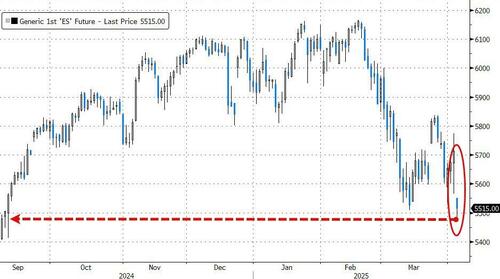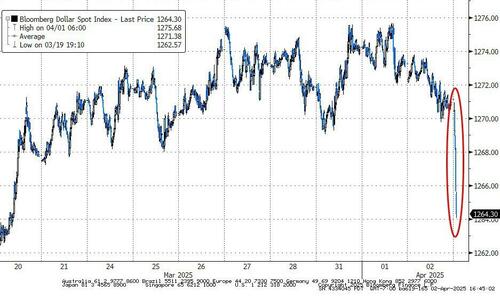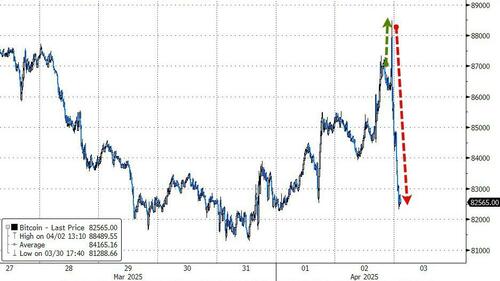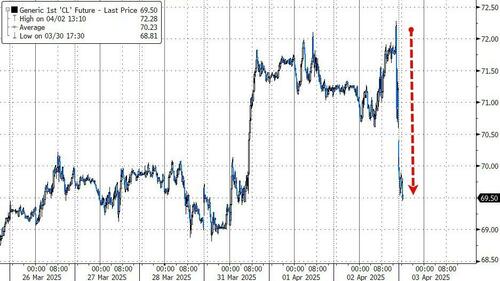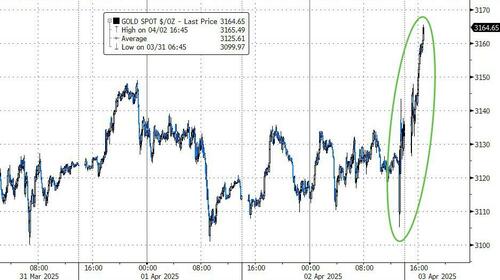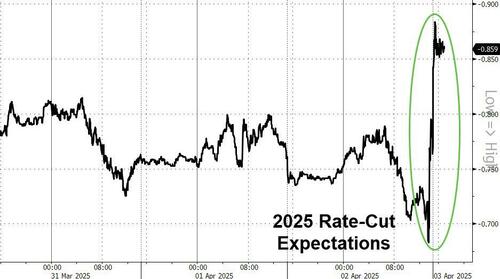Wall Street Reacts To Trump's 'Liberation Day' Tariff Announcements
Markets across the world are reacting (dramatically) to President Trump's reciprocal tariff announcement this evening with a baseline 10% tariff for all nations and reciprocal tariffs of up to 50% on so called 'bad actor' nations.
The most obvious reaction was in US equity markets where futures plunged 3-4% to their lowest levels since September as Asian markets opened...
The US dollar puked...
And Bitcoin tumbled to yesterday's lows after spiking above $88,000 on the initial optimism that Trumpo's news was 'better than feared'...
Crude prices (WTI) dropped back below $70...
Treasuries were aggressively bid back to the low yields of the day (and lowest level for the 10Y since October)...
And gold soared to a new record high...
...suggesting this is far from over... and tonight's announcement was far from a 'clearing event'.
As Bloomberg reports, strategists and money managers are now poring over the fine print of the upcoming import taxes.
Michael O’Rourke, chief market strategist at JonesTrading Institutional Services:
“This looks like it will net out to be worse than the 20% plan. Considering all of the US products manufactured in Asia, these tariff rates of ~20% to ~34% are steep. I see Taiwan is 32%, which will restrain the semiconductor space.
That should slow trade and raise prices, squeezing profit margins. This will further slow a decelerating economy as it creates friction and distortion in global trade. I think we need to expect retaliation — which will likely lead to further escalation.”
Matt Maley, chief market strategist for Miller Tabak + Co.:
“There was not the kind of last-minute relief that some investors had been hoping for recently. So, it looks like the Trump Administration is not worried about the near-term impact these tariff policies will have on the markets.
This means the focus on earnings guidance over the coming weeks will be intense. If earnings estimates continue to decline, it will create even stronger headwinds for the stock market.”
Chris Zaccarelli, chief investment officer at Northlight Asset Management:
“If there is going to be a silver-lining - and this remains to be seen - then hopefully these tariff rates are only the beginning of a negotiation which will bring rates down across the board.”
Steve Chiavarone, head of multi-asset group at Federated Hermes:
“If today’s announcement marks the most draconian levels of tariffs — and the news flow from here is about how countries are negotiating reductions to these rates — that could be good for markets.
This may create enough of a sell-off over the next day or so that it creates a buying opportunity.
Worst-case scenario today would’ve been at a low rate with threats of escalation. I’d rather, at this point, have higher rates with the potential to deescalate.”
Priya Misra, portfolio manager at JPMorgan Asset Management:
“We have been positioned into ‘Liberation Day’ via owning high-quality credit and have been buying duration in the intermediate sector to hedge if the economic hard data slows. We still like this position heading into payrolls on Friday. There is a stagflationary impulse with tariffs, which will force the Fed to be behind the curve.
[ZH: Indeed, Fed rate-cut expectations have spiked since the news...]
The economy and the market is grappling with many different cross currents with downside risks to growth :
1) Tariffs (which are a tax on consumers and/or corporates)
2) Cutting government spending via DOGE
3) Uncertainty. I am most concerned with the uncertainty aspect, which is affecting businesses and consumers.
If the next few months or quarters are spent in trade negotiations, that uncertainty remains high. I worry that some of the damage has been done already, so I worry about the growth implications.”
Ed Al-Hussainy, rates strategist at Columbia Threadneedle:
“Clearly, this is a concrete negative shock to the economy. What is clear and clean is that we have to fully price in the negative shock upfront.
At end of the day, this is a tax — who will pay for the tax is uncertain – but I don’t think you can see this as growth positive in any way. It’s growth negative and inflation positive in the short term.”
Max Gokhman, deputy chief investment officer at Franklin Templeton Investment Solutions:
“The biggest question is whether it will be as easy for countries to dodge the gut punch of reciprocal tariffs as in previous volleys. If not, and a true trade war engulfs the world then stagflation seems likely, leaving only bruised losers.
Given that this remains a significant unknown however, we are not changing our positioning just yet staying generally neutral across regions and sectors.”
Liz Ann Sonders, chief investment strategist at Charles Schwab:
“I think what we’re likely to see fairly soon is a re-rating of the probabilities of recession. It would not surprise me at all if we see those notched up.
At the very least, we’re going to see further downward pressure on 2025 estimates for company profitability. The path of least resistance for earnings is significantly down from here.”
Finally, and likely what many in The White House (and on Wall Street) are hoping, former Commerce Secretary Carlos Gutierrez told CNBC that he expects most of these tariffs to be gone within a few months as countries rush to the negitiating table
"I would assume that this will not be in place in a month, two months. Definitely not in the back half of the year. So I'm in the camp that this is at the beginning of a big negotiation."
"It's not only about bringing production back, but it's also about market access."
JUST IN: Former Commerce Secretary predicts Trump's tariffs won't be in place by the back half of 2025 because other countries will rush to the negotiating table.
— Collin Rugg (@CollinRugg) April 2, 2025
Former George W. Bush Commerce Secretary Carlos Gutierrez just made the prediction on CNBC.
Gutierrez went as far… pic.twitter.com/8yyGiuwx0j
We are left with Treasury Secretary's Bessent's warning to the world: Don’t panic, don’t retaliate
“As long as you don’t retaliate, this is the high end of the number,” he says.


